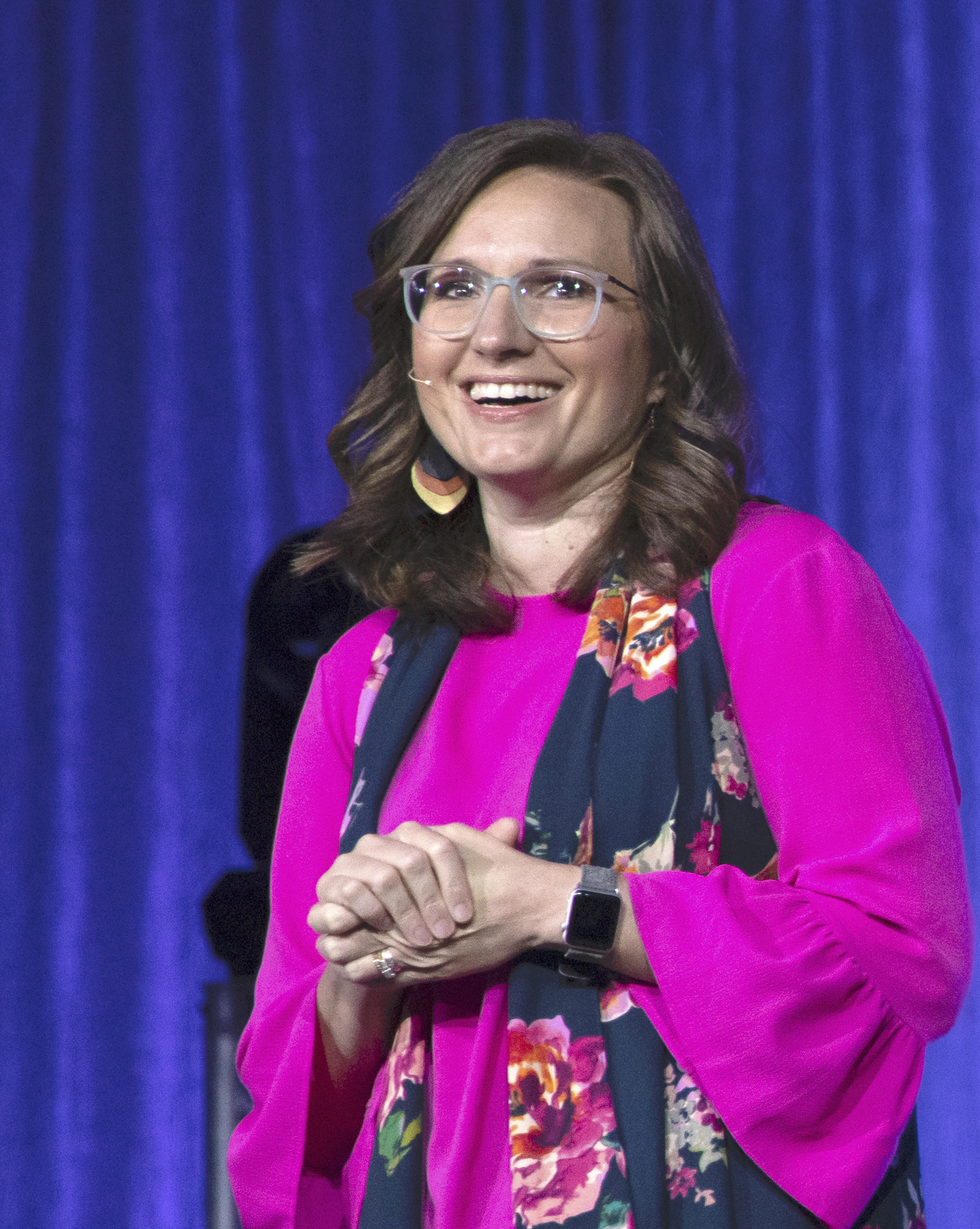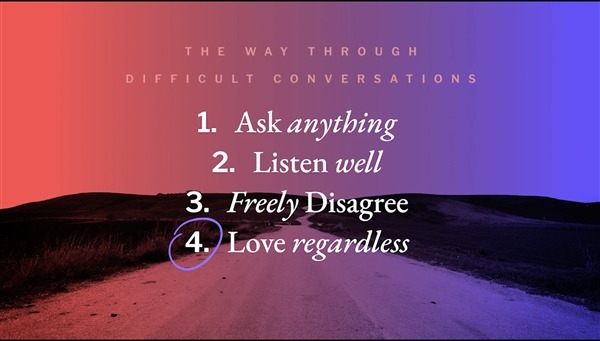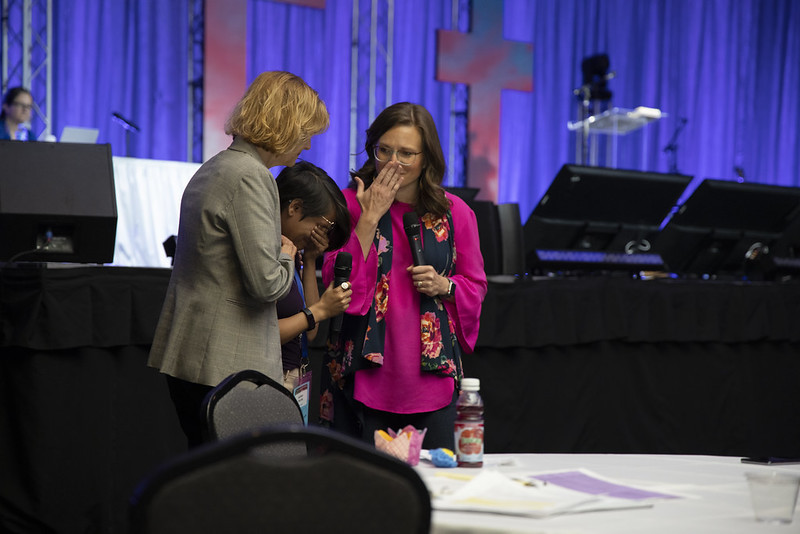
Rev. Rachel Billups: The way through hard conversations and a new season of discipleship

Rev. Rachel Billups addresses the Dakotas Annual Conference during a morning teaching session, June 12, 2021. Photo by jlynn studios.
“I’ve come to believe that we will need a new language among our churches to create conversations that will move us forward,” said Rev. Rachel Billups, lead pastor at Ginghamsburg Church in Tipp City, Ohio. “I believe we will need new methods of discipleship that effectively connect with up-and-coming generations. And if Jesus truly is the Waymaker, and I desperately believe that he is, then Jesus is already making a way through these cultural shifts we are living through."
In a two-part teaching session delivered to Dakotas United Methodists on Saturday, June 12, Billups shared practices for being peacemakers as we seek to bridge the significant divides around us and talked about why and how to tell our Jesus stories as we seek to disciple others.
Navigating difficult conversations
Touchy issues can break up a connection and lead to the unraveling of a relationship, leaving us divided, Billups said. When it comes to difficult topics—money, politics, immigration, racism, our LGBTQ+ siblings—we need help and our churches need help.
“Let’s allow Jesus to be our way through hard conversations,” she said, pointing out that Jesus listened well, learned all he could, asked great questions, and spoke with the truth that would ultimately set people free.
Referencing Jesus’s Sermon on the Mount, Billups reminded us that Jesus said, “Blessed are the peacemakers, for they will be called children of God.” She urged us to embrace this difficult but critically important role as peacemakers.
“Peacemakers see the bigger picture, lean into the conflict, and attempt to establish resolve to outer and inner turmoil,” she said.
So how do we become peacemakers? Billups said Ginghamsburg has adopted practices for peacemaking that were developed by the student ministry at National Community Church in Washington, D.C.—a congregation that has grown exponentially and includes people from different sides of the political aisle:

The four practices of peacemaking adopted by Ginghamsburg Church.
1. Ask anything. When conversations get hard, we tend to either clam up or get into an argument. “What if our first thought was to ask helpful questions, recognizing that each person has place has place that they’re coming from that’s been informed by their own experiences?” Billups asked. “Asking insightful questions demonstrates that relationships are more important than being right. It’s extending the bridge out to be crossed over.” Doing this requires us to cultivate a culture of trust that says “I’ll stay even if I don’t agree” and space where challenging questions are not merely tolerated but encouraged.
2. Listen well. At Ginghamsburg, Billups meets with all of the staff teams at least annually for what she calls “listening circles.” It’s an opportunity to hear what the teams are excited about, what they are concerned about, and their dreams for the church’s future. “Genuine listening means ‘I hear you, I see your concern, I value you as a child of God,’” said Billups.
3. Freely disagree. “The kingdom of God is big and it’s diverse” and “difference brings strength and beauty,” said Billups. Difference is not just good. It’s God’s design from the beginning: God looked out over God’s very diverse creation and said it was very good.
4. Love regardless. “Love when it would be easier to just put someone in a category, place them in a box, attempt to ‘other’ one another, or even label them as the enemy,” said Billups. “When we love regardless, people will know that we follow Jesus.”
Ginghamsburg has made these practices accessible and engaging by doing one-hour listen and learn events. During the pandemic, they have taken place on Zoom with a presenter sharing their story for 20 minutes and then others engaging in conversation around it.
Sharing our stories
Rev. Rachel Billups shared both why telling our story is important and some tips for doing so.
“It doesn’t matter whether you have 50 or 5 or 500 people attending your church,” said Billups. “You’ve got folks sitting in your congregation and participating online with God stories of their own—lives that have been touched and turned around by Jesus…We have the calling as leaders to create cultures for people to grow and thrive in their God purposes.”
Do you know that sharing your God story is the very best tool for discipleship? Billups asked, noting that Jesus constantly used the power of a simple story to share his profound truths. There is an up-and-coming generation wanting to know: Is this Jesus thing real? If it is, there’s got to be evidence in your life and fruit from your faith.

Aabiskar Sharma, center, who is from Napal and staying with Bishop Laurie and Rev. Gary Haller to attend school, receives a hug of support from Bishop Laurie (left). Aabiskar bravely shared her God story with the Dakotas Annual Conference.
Why is telling our story so important?
• Telling our story names the why. “We church leaders are people who specialize in telling people the ‘what,’” said Billups. “We think people just need to hear the facts and their faith will grow.” We offer classes, learning sessions, and webinars—but at some point, it’s just information. “We’ve been called to the business of transformation. Sharing our stories of transformation strengthens the why of discipleship.”
• Telling our story elevates authenticity. People are looking for regular life shaped and transformed by Jesus, the Waymaker. Telling our Jesus stories gives others permission to talk about real life out loud.
• Telling our story empowers people. Most people in your congregation don’t want to sit on the sidelines but they also don’t feel empowered to engage others into faith. We must equip them to do so because when they do, “everyone has access, everyone has the keys to be part of the movement.”
• Telling our story moves the mission forward. “There’s an assumption that with the right programming, people will be discipled,” said Billups. “There’s one problem: Programs don’t make disciples. Disciples make disciples.” Jesus gave us a model: People disciple people through a common language of story. “When we share our stories, it moves the mission forward.”
• Telling our story reshapes culture. When people experience your church for the first time, does it feel like a movement or an institution? Billups asked. “When infused with a people who know how to simply share their everyday faith, your church is going to feel like a movement every single time.”
Billups referred to the biblical story of the woman at the well. Her experience with Jesus transformed her, and that transformed woman then went and told others her Jesus story. It changed her and her entire community; it reshaped a culture. Billups offered several simple tips for sharing our stories:
• Keep it simple. At work, in your neighborhood, when picking up your kids or grandkids, share “this is what Jesus is doing in my life.”
• Capture it: Nowadays, you can do that via video, Zoom, a smartphone, a social media post, a written testimony in worship, or a church newsletter.
• Integrate it: Integrate people’s stories into every area of church life. When you train various teams, give them tools to share their God stories. Invite people to talk about how God is moving in their life right here, right now.